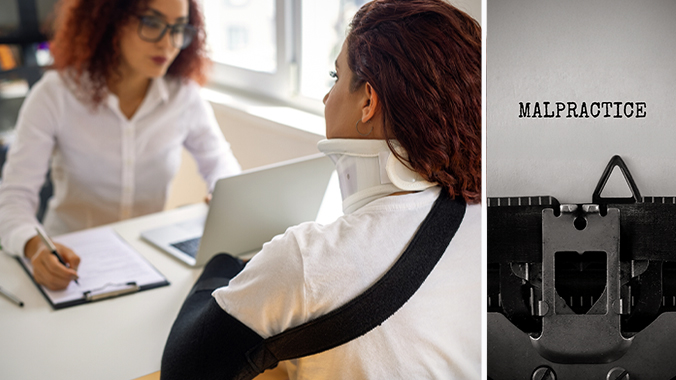The ADA: Required reading in the fitness for duty field

William D. Goren, Esq., of William D. Goren, J.D., LL.M. LLC in Decatur, GA, has been dealing with the ADA as an Attorney since 1990.

Robert S. Emmons, M.D., practices as a psychiatric psychotherapist in Williston, Vermont.
On-Demand: June 6, 2024
2 hour CLE
Tuition: $195.00
Co-Sponsored by myLawCLE
Get this course, plus over 1,000+ of live webinars.
Learn More
Training 5 or more people?
Sign-up for a law firm subscription plan and each attorney in the firm receives free access to all CLE Programs
Program Summary
Dr. Emmons will use his experiences with physicians facing allegations of workplace impairment to illustrate how the requirements of the ADA apply to the task of the ethical psychiatric evaluator of fitness for duty. He will also speak to effective collaboration between ADA-informed attorneys and psychiatric experts while William Goren will go over basic definitional terms that are critical for understanding common mistakes that create ADA liability exposure in this area.
This course is co-sponsored with myLawCLE.
Key topics to be discussed:
- Ensuring the Independence of Evaluators from Referral Sources Hostile to Evaluees’
- Limiting The Scope of Inquiry in Order to Meet ADA Requirements
- Framing Referral Questions for Experts in Order to Protect the Integrity of The Evaluation Process
- How Does the ADA Defines Disability
- Critical Distinction Between Who Is a Qualified Person with A Disability in Title I V. Title II
- Unnecessary Medical Inquiries and How That Varies from Title I V. Title II-III
- Important Distinctions When Dealing with the ADA Concept of Direct Threat
- Why Licensing Counsel Failing to Utilize the ADA Is a Legal Malpractice Suit Waiting to Happen
![]() Closed-captioning available
Closed-captioning available
Speakers
 William D. Goren | William D. Goren JD LLM LLC
William D. Goren | William D. Goren JD LLM LLC
William D. Goren, Esq., of William D. Goren, J.D., LL.M. LLC in Decatur, GA, has been dealing with the ADA as an Attorney since 1990. His law and consulting practice, https:/ www.understandingtheada.com/, as well as his blog, Understanding the ADA, (an ABA Top 100 for five consecutive years during the last five years of the award, 2014-2018), all focus on understanding the ADA so that the client understands what it means to comply with that law and related laws. In particular, he provides consulting, counseling, representation, and training services involving compliance with the Americans with Disabilities Act, Rehabilitation Act of 1973, and related laws- such as the Air Carrier Access Act and the Fair Housing Act-, among others.
Mr. Goren also brings a deep, personal understanding of what it means to have a disability, equipping him with exceptional insight on how the ADA actually works. He is deaf with a congenital bilateral hearing loss of 70–120+ decibels, but functions entirely in the hearing world thanks to hearing aids, Bluetooth technology, automatic speech recognition, and lip- reading. For reasons independent of his deafness, he also uses voice dictation technology to access his computer.
He is also a frequent presenter, a trained mediator, a FINRA arbitrator (Chairperson eligible), and an arbitrator on the CPR employment panel. Finally, he is the author of Understanding the ADA, now in its 4th edition (ABA 2013), and numerous other articles on the rights of persons with disabilities. He is and has been a member of various committees of the American Bar Association, including: Legal Technology Resource Center Board (2017-2023); ABA Law Practice Section Client Development and Marketing Committee; ABA Law Practice Section Ethics and Professionalism Committee and the ABA’s Law Practice Section DEI committee. He is also a member of various committees of the Federal Bar Association, including: the Federal Bar Association (FBA) Diversity and Inclusion committee; the FBA’s Civil Rights section and its Governing Board; FBA’s Civil Rights Amicus committee; and since 2022, the Chair of the FBA’s Disability Best Practices Working Group. In the first year of the Disability Best Practices Working Group, it formulated an accessibility manual for the FBA and its chapters. In the second year of the committee, it will be bringing out an accessibility manual that federal courts can use to help ensure that their courtrooms are accessible for persons with disabilities.
He is also a member of the Deaf and Hard of Hearing Bar Association. He has an A.B. from Vassar College, a J.D. from University of San Diego School of Law, and was one of the first in the entire country to receive the LL.M. in Health Law, in his case from DePaul University College of Law. Interesting fact: He trained his miniature poodle to be a hearing dog while he practices virtually.
 Robert S. Emmons | Williston, Vermont
Robert S. Emmons | Williston, Vermont
Robert S. Emmons, M.D., practices as a psychiatric psychotherapist in Williston, Vermont. He has worked as an expert evaluating physician fitness for duty since 2013. He is licensed to practice medicine in Vermont, and he teaches regularly in the Department of Psychiatry, University of Vermont College of Medicine, as a Clinical Associate Professor. Contact: [email protected].
Agenda
I. Ensuring the Independence of Evaluators from Referral Sources Hostile to Evaluees’ | 11:00am – 11:15am
II. Limiting The Scope of Inquiry in Order to Meet ADA Requirements | 11:15am – 11:30am
III. Framing Referral Questions for Experts in Order to Protect the Integrity of The Evaluation Process | 11:30am – 11:40am
IV. How Does the ADA Defines Disability | 11:40am – 12:00pm
Break | 12:00pm – 12:10pm
V. Critical Distinction Between Who Is a Qualified Person with A Disability in Title I V. Title II | 12:10pm – 12:25pm
VI. Unnecessary Medical Inquiries and How That Varies from Title I V. Title II-III | 12:25pm – 12:40pm
VII. Important Distinctions When Dealing with the ADA Concept of Direct Threat | 12:40pm – 12:55pm
VIII. Why Licensing Counsel Failing to Utilize the ADA Is a Legal Malpractice Suit Waiting to Happen | 12:55pm – 1:10pm
Credits
Alaska
Approved for CLE Credits
2 General
Alabama
Pending CLE Approval
2 General
Arkansas
Approved for CLE Credits
2 General
Arizona
Approved for CLE Credits
2 General
California
Approved for CLE Credits
2 General
Colorado
Approved for Self-Study Credits
2 General
Connecticut
Approved for CLE Credits
2 General
District of Columbia
No MCLE Required
2 General hours
Delaware
Pending CLE Approval
2 General
Florida
Approved via Attorney Submission
2.5 General Hours
Georgia
Approved for CLE Credits
2 General
Hawaii
Approved for CLE Credits
2 General
Iowa
Pending CLE Approval
2 General
Idaho
Pending CLE Approval
2 General
Illinois
Approved for Self-Study Credits
2 General
Indiana
Pending CLE Approval
2 General
Kansas
Pending CLE Approval
2 Substantive
Kentucky
Pending CLE Approval
2 General
Louisiana
Pending CLE Approval
2 General
Massachusetts
No MCLE Required
2 General
Maryland
No MCLE Required
2 General
Maine
Pending CLE Approval
2 General
Michigan
No MCLE Required
2 General
Minnesota
Approved for Self-Study Credits
2 General
Missouri
Approved for CLE Credits
2.4 General
Mississippi
Pending CLE Approval
2 General
Montana
Pending CLE Approval
2 General
North Carolina
Pending CLE Approval
2 General
North Dakota
Approved for CLE Credits
2 General
Nebraska
Pending CLE Approval
2 General
New Hampshire
Approved for CLE Credits
120 General minutes
New Jersey
Approved for CLE Credits
2.4 General
New Mexico
Approved for Self-Study Credits
2 General
Nevada
Approved for Self-Study Credits
2 General
New York
Approved for CLE Credits
2.4 General
Ohio
Pending CLE Approval
2 General
Oklahoma
Pending CLE Approval
2.5 General
Oregon
Approved for Self-Study Credits
2 General
Pennsylvania
Approved for Self-Study Credits
2 General
Rhode Island
Pending CLE Approval
2.5 General
South Carolina
Pending CLE Approval
2 General
South Dakota
No MCLE Required
2 General
Tennessee
Pending CLE Approval
2 General
Texas
Pending CLE Approval
2 General
Utah
Pending CLE Approval
2 General
Virginia
Not Eligible
2 General Hours
Vermont
Approved for CLE Credits
2 General
Washington
Approved via Attorney Submission
2 Law and Legal Hours
Wisconsin
Approved for Self-Study Credits
2 General
West Virginia
Pending CLE Approval
2 General
Wyoming
Pending CLE Approval
2 General
Preview
More CLE Webinars
Trending CLE Webinars






Upcoming CLE Webinars




























![5th Annual Tax Rep Summit [3-Day Event] (Presented by Tax Rep)](https://federalbarcle.org/wp-content/uploads/2025/10/Product_img_-5th-Annual-Tax-Rep-Summit.jpg)





















